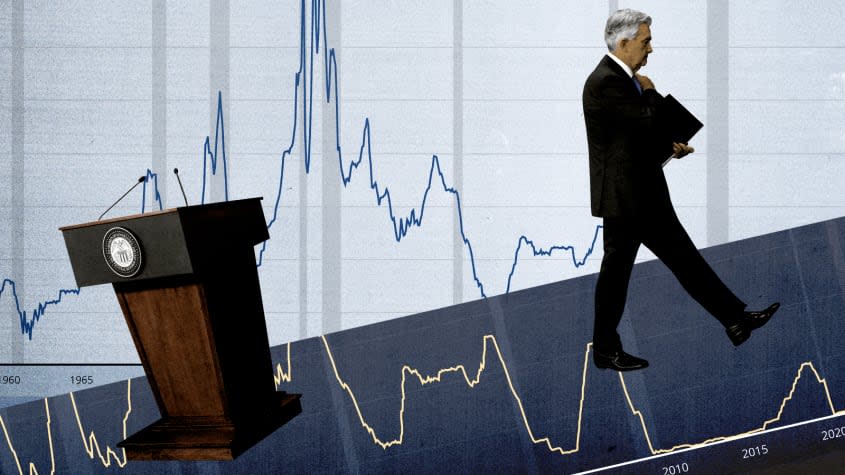Did the Fed's rate hike go too far, or not far enough?

- Oops!Something went wrong.Please try again later.
- Oops!Something went wrong.Please try again later.
The Federal Reserve on Wednesday raised interest rates a whopping three-quarters of a percentage point, in hopes of taming rampant inflation tearing through the U.S. economy. Though investors and economists were ultimately expecting such an increase, that didn't make the hike — the central bank's largest since 1994 — any less of a bombshell. Here's a look at the state of the conversation surrounding the monumental change:
It's going to take more than that
Such an increase indicates the Fed is finally "slouching toward inflation reality," though the bank still might have to do more, The Wall Street Journal Editorial Board argued Wednesday. "The Fed is front-loading its rate increases, but it's still not anticipating that it has to go all that high to beat inflation."
Yes, it's possible Wednesday's hike (as well as the similar bump expected in July) will dampen rising prices, "but at this rate it's going to take a while," the board wrote. The bank is headed in the right direction, and its optimism is, of course, somewhat appreciated — but is it realistic?
"Regaining the Fed's inflation-fighting credibility after two years of mistakes will take more than one 75-basis-point increase," the board continued, "and Americans will believe it only when they see it in falling prices."
The decision reflects courage and independence
In approving the 0.75-point increase, Powell has "gone a long way to restoring the Federal Reserve's inflation-fighting reputation — and provided a lesson in how government functions when presidents respect institutions," mused contributing Washington Post columnist Sebastian Mallaby.
In fact, Powell can only courageously administer such "tough medicine" because President Biden supports him, Mallaby wrote. By previously pledging to respect the central bank's independence, "Biden has freed Powell to do the right thing without having to worry that vacant slots on the Fed board will be filled with presidential loyalists who aim to undermine him."
But the chairman's work is, of course, "far from done," and he will most likely have to trigger a recession to get things under control — a tactic that certainly won't win him (or Biden) any fans among the American public. "As the 1970s showed," Mallaby continued, "the only thing less popular than inflation is its cure."
Both the U.S. and the Fed needed this
Not only did the economy need a three-quarters of a percentage point rate hike, the Fed should have made such a decision far earlier, Steven Rattner, who served as counselor to the Treasury secretary under former President Barack Obama, opined for The New York Times prior to the official decision. The war in Ukraine has of course played a part in rising prices — "but so have policy errors, for which the central bank bears significant responsibility, along with the Biden administration."
Therefore, the Fed "must make amends for its mistakes," and a "75-basis-point increase … would be an extraordinary step," Rattner wrote. Such a hike, "coupled with a strong statement that it will continue to address inflation aggressively, would help shore up the Fed's shaky credibility."
Speaking with Bloomberg, Mark Carney, the former governor of the Bank of England, also called out the Fed's delay in active monetary policy-making. "Central bankers need to catch up to their economies," he said, per The Guardian. "They've been behind the curve, they've acknowledged this. They need to start to get interest rates above inflation effectively, or at least inflation expectations."
Think of the unintended consequences
Writing for The Wall Street Journal, Judy Shelton, a senior fellow at the libertarian Independent Institute, argued in the wake of the bank's decision that the "unintended consequences" of high interest rates — like bankruptcies and defaults — should actually "cause us to rethink how the Fed intervenes in the economy."
"Neither artificially high interest rates nor artificially low interest rates are most conducive to productive economic growth," Shelton mused. "What a market economy needs is meaningful price signals — real interest rates."
This … is bad
"History will not judge the Jerome Powell Federal Reserve kindly," said American Enterprise Institute's Desmond Lachman in CNN. With this new rate increase, "the Fed is now stepping too hard on the monetary policy brakes in much the same way it kept its foot on the accelerator for too long last year." For one thing, the Fed-caused declines in equity and bond prices will "almost certainly" result in a cut to consumer spending, which is "the last thing that an already slowing US economy needs," Lachman posited.
The bank's "newfound monetary policy hawkishness" is driving the U.S. straight into a recession, and Powell might "do well to heed his own advice of needing to be humble and nimble, especially given today's highly fragile financial markets," lest he bear responsibility for pushing the U.S. into a downturn.
You may also like
The Ezra Miller accusations, explained
Tom Hanks says he couldn't play a gay man in Philadelphia today, 'and rightly so'
Lock him up? The risks and rewards of prosecuting Trump over Jan. 6

